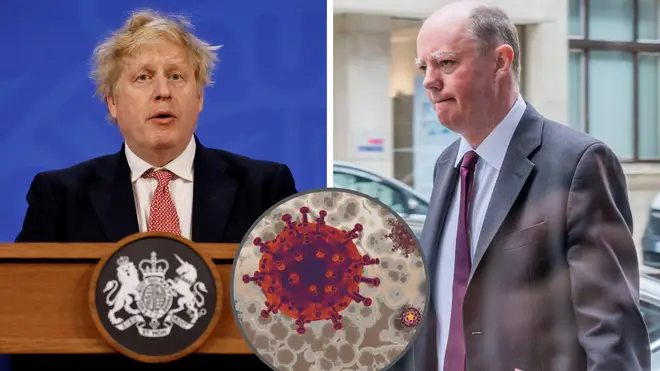
Clive Bull 1am - 4am
21 February 2022, 19:40 | Updated: 7 June 2023, 08:56

The Chief Medical Officer for England has recommended people still isolate if they test positive for coronavirus, just hours after the Prime Minister scrapped mandatory isolation rules.
During a press conference on Monday evening, Professor Chris Whitty confirmed that "standard public health advice" will continue to be to self-isolate if you have Covid.
The medical expert stressed guidance around the virus is now similar to public health advice about other illnesses such as norovirus, adding that the wearing of face masks in crowded public places "remains sensible and pragmatic advice".
Addressing the nation he said: "As we look at the next weeks, we still have high rates of Omicron and I would urge people in terms of public health advice, and this is very much the Government's position, that people should still if they have Covid try to prevent other people getting it and that means self-isolating.
"So, that is the public health advice. It would have been the public health advice, and will be the public health advice, for multiple other diseases," he said, describing it as "standard public health advice for a significant and highly transmissible infection".
Read more: PM hails 'moment of pride' as Covid restrictions scrapped but says virus isn't beaten yet
Explained: Living with Covid plan: How Britain is set to change in the days ahead

Chris Whitty says those who have Covid should still self-isolate
Prof Whitty said maximising ventilation, hand washing and using face masks in enclosed spaces with large numbers of people when there are significant numbers of cases remain important.
His contradictory advice comes after Boris Johnson announced the requirement to self-isolate after testing positive for coronavirus will be lifted from Thursday.
In addition to scrapping self isolation, routine contact tracing will end, as will the need for fully vaccinated close contacts of positive cases and those aged under 18 to test daily for seven days.
The £500 isolation payment for people on low incomes will no longer be available from Thursday, while increased statutory sick pay will apply for a further month. Free rapid tests will end in England on April 1.
Only the oldest and most vulnerable will continue to receive them for free, whilst the guidance for twice-a-week testing in schools and education is also ending.
Read more: Angel Lynn kidnapper's 'unduly lenient' sentence referred to Court of Appeal
Read more: Putin to recognise rebel regions in eastern Ukraine - as PM warns of ‘ill omen’

Boris Johnson says 'our scientists are certain that there will be new variants'
Professor Whitty said good surveillance, capacity to rapidly step up and protecting the most vulnerable are "the critical things that we need to maintain even beyond this next few weeks into the rest of this year and the rest of the way that we continue to manage this epidemic".
Boris Johnson and chief scientific adviser, Sir Patrick Vallance also spoke about the change of Covid policy in England during the conference.
Sir Vallance begins to speak also gave a warning to the public, predicting the the virus will continue to evolve quickly over next couple of years, adding there is no guarantee that the next variant will be of the same reduced severity as Omicron.
Mr Johnson said there will likely be another variant that will "cause us trouble".
Speaking at the press conference, he said: "I don't want you to think that there's some division between the gung ho politicians and the cautious, anxious scientists, much as it may suit everybody to say so.
"We have a very clear view of this. This has not gone away. We're able to make these changes now because of the vaccines and the high level of immunity and all the other considerations about Omicron that you've seen.
"But we have to face the fact that there could be, likely will be, another variant that will cause us trouble.
"But I believe that thanks to a lot of the stuff that we've done, particularly investment in vaccines and vaccine technology and therapeutics, we'll be in a far better position to tackle that new variant when it comes."